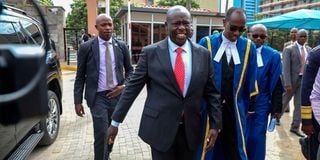
Deputy President Rigathi Gachagua arrives for his impeachment hearing at the Senate in Nairobi on Wednesday, October 16, 2024.
Late last week Stears, a pan-African financial data and intelligence firm, issued a widely covered report saying political tension, and a growing debt threat, were a threat to Kenya’s growth.
The analysis by Stears, which has key offices in Lagos, Abuja, and London, is reportedly becoming one of the important sources of insights used by several companies to make investment decisions on the continent. It specifically noted the political uncertainty driven by the push to impeach Deputy President Rigathi Gachagua, and what it said was dissatisfaction with President Ruto’s handling of police brutality during the July Generation Z protests, as significantly influencing Kenya’s economic environment.
Its report touched on other factors causing negative investor sentiment on Kenya, including its credit rating being downgraded to “junk”.
One of the striking things about Kenya, much like economies like the US, and closer home countries like Nigeria and South Africa, is that possibly 40 per cent of the risk is produced by political noise, and not necessarily facts on the ground.
Vice-Presidents do come and go quite a lot in the world, but few have been as loud as the drama around Mr Gachagua. In many an African country, people only wake up to the news that the VP resigned or was sacked. By the end of the day, they have moved on to more interesting things like discussing the nude video of a local celebrity that just leaked on social media.
Political feuds
Indeed, as Gachagua’s adversaries were closing in for the kill, the Ethiopian parliament approved the appointment of a new President to replace the country's first female Head of State, Sahle-Work Zewde.
Sahle-Work’s term in the largely ceremonial role was due to expire at the end of the month, but it was only after the Parliament vote and her cryptic post on X (formerly Twitter) that the media raced to catch up with reports that she had been unhappy and had fallen out with Prime Minister Abiy Ahmed in recent times. A political event of that magnitude can’t arrive in Kenya unaccompanied by an orchestra, nor can a big man or woman go quietly like that. An elaborate national infrastructure has developed in Kenya to curate and dramatise political feuds.
It always starts small. Usually, what the media call “allies” of the big man, some kind of political mine sweepers, will fire the first shots and say a cabinet secretary or DP in Gachagua’s case, is undermining the President or dividing the country.
The ally can be anything from a busy body in Nairobi, to an obscure ward rep in a sleepy county you rarely see in the news — the devolved structures just expanded the field where political wars are fought.
Before you know it, the video clip is going viral on social media, and popping up in every WhatsApp you are in. Then a member of Parliament will pick it up, and the many Kenyan YouTube political commentary channels will jump on it, and it lands on the front pages of newspapers, and every TV is kicking the issue in its talk shows. Soon, leaders of obscure regional or ethnic groups will jump into the fray, some of them declaring war if their son or daughter is ousted from government.
Opinion polls
Then some Cabinet secretaries will chip in, and it will land on the lap of pastors and bishops. Many a Sunday service, which is a great amplifier, will have the pastor or bishop weighing in on one side or the other. Whatever they say is amplified in the media and social media. Then the matter will be taken to funerals by politicians, and it will get more coverage.
Ala Gachagua, the besieged party will rush to court, where twenty other people will also have petitioned to stop the impeachment or whatever action.
By that point, it has become a national frenzy, with special reports examining whether the target will survive or perish, and opinion polls ferreting out the thoughts of ordinary Kenyans.
A council of bishops, and one or two of the western embassies (African ones don’t), will issue a statement urging Kenyans to remain calm. People like us will get calls — sometimes up to six a day — from abroad inquiring whether we are safe and whether we had stocked up on supplies, as the many foreign journalists based in Nairobi will have done their duty and reported about the “mounting tension”. On more than one occasion, I got a message from caring folks telling me they had paid for my safety at their local church.
What was a magnitude 1.5 political earthquake, now seems like a 6.5, although it is a 1.5. Ironically, this is partly a product of a good thing, the considerable level of freedom Kenyans still have to make noise. It is an explosive mix when it meets the divisions within its political class and elite.
It is the modern-day equivalent of a battle in an ancient Roman Colosseum with frenzied crowds in the stands, the difference being that no gladiators die.
The author is a journalist, writer, and curator of the “Wall of Great Africans”. Twitter@cobbo3.








